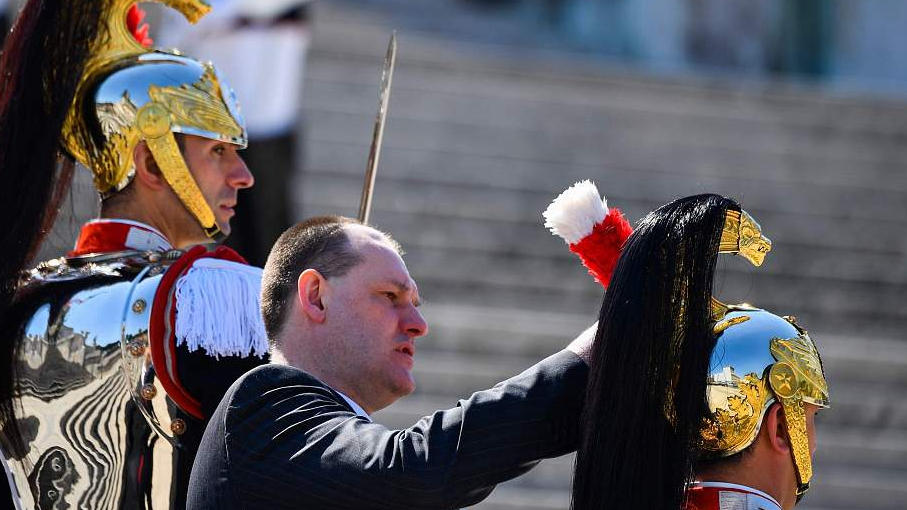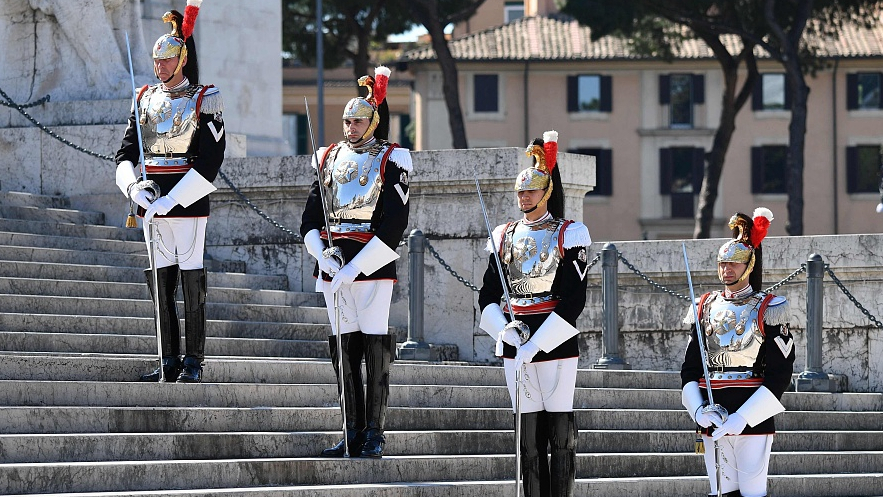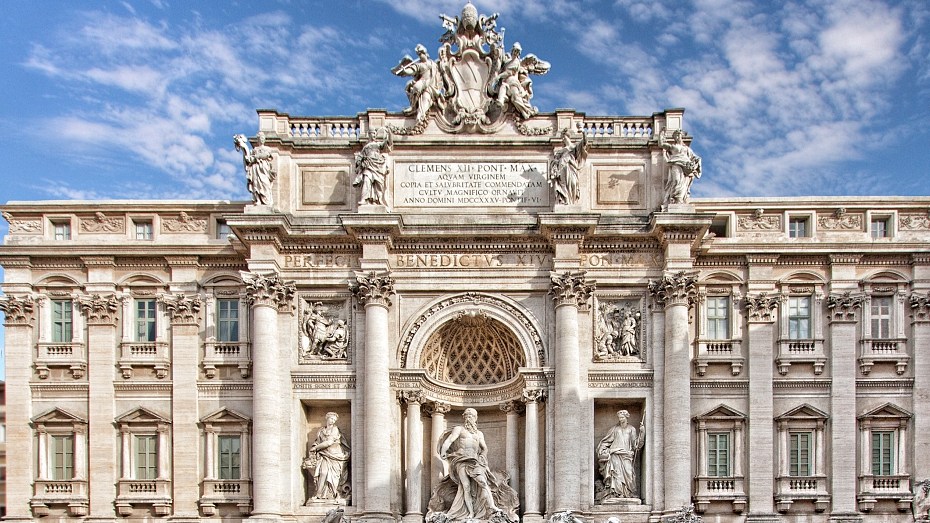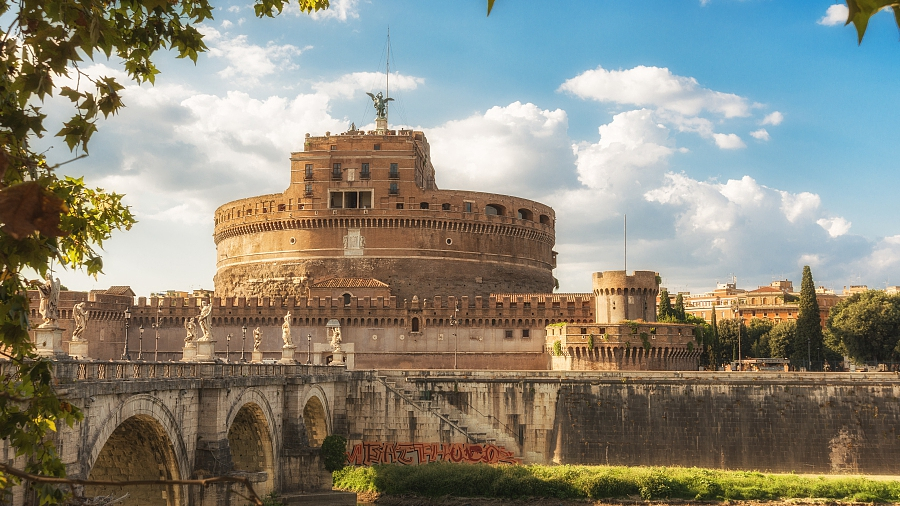
Opinion
20:45, 23-Mar-2019
Looking to a rational and stable partnership between China and Italy
Wang Li

Editor's note: Wang Li is a professor at Jilin University. The article reflects the author's opinion, and not necessarily the views of CGTN.
Chinese President Xi Jinping has made his historic state visit to Italy, the first stop of his three-nation grand tour in Europe. Given that China and the EU released last week the "Ten-point Consensus," in which both China and the EU vow to support the implementation of the 2030 Agenda for Sustainable Development and defend the post-war international system and order with no allowing for constructing another system anew, the world is sure to grasp the strategic caliber of Chinese leadership headed by Xi during his trip to the EU.

Presidential Honor Guards of the Reggimento Corazzieri, or The Cuirassiers' Regiment, wait for the arrival of the Chinese President to lay a wreath at the tomb of the unknown soldier at the Altare della Patria monument. /VCG Photo
Presidential Honor Guards of the Reggimento Corazzieri, or The Cuirassiers' Regiment, wait for the arrival of the Chinese President to lay a wreath at the tomb of the unknown soldier at the Altare della Patria monument. /VCG Photo
First, Italy was one of the major European power to recognize the People's Republic of China before the rapprochement between Beijing and Washington. Second, Italy, the Eurozone's third-largest economy, is the first G-7 member to formally involve into China's Belt and Road Initiative (BRI).
It means a new gateway to the European market for China and a multi-billion U.S. dollar investment for Italy. In addition, China and Italy share a strong commitment to the environment and green development concepts and projects, not to mention the long-term collaboration in the fields of logistics, infrastructure, energy, telecoms, medicine and even fashion-designing.
Except for bilateral economic ties, China and Italy have intended to advance coordination in international affairs and multilateral organizations like the UN, the G-20 and the WTO.
As President Xi stated in his signed article, his visit was expected to herald a new era for the two countries cemented by a solid, comprehensive strategic partnership in 2004.

The Trevi Fountain in Rome. /VCG Photo
The Trevi Fountain in Rome. /VCG Photo
Since then, both sides have envisioned a new type of international relations that are built on mutual respect, fairness, justice and win-win cooperation. The two governments have approached reciprocally from strategic and long-term perspectives, based on the understanding of each other's core interests and major concerns. While some Sino-skeptics entertain suspicion on the peaceful rise of China in view of national security, many Italians are no longer willing to perceive China as a threat at the least in the near future.
Be aware of the uneven road ahead for the two countries, President Xi‘s talk to the Italian Senate continue to play an active role in further development of the ties with China.
Since China and Italy established diplomatic relations in 1970, the duo has become close and important partners that share mutual trust while maintaining pragmatic cooperation. In terms of the vicissitudes of the upcoming decades, it is imperative for the two sides to deepen their long-term strategic partnership.

Castel Sant'Angelo,Roma,Italy. /VCG Photo
Castel Sant'Angelo,Roma,Italy. /VCG Photo
In so doing, Xi did take the BRI as an example, something both sides would work closely and comprehensively. Echoing Xi's remarks, both Elisabetta Casellati and Robert Fico, the President of the Italian Senate and the Low House Speaker, called for the two states and two peoples strengthening their strategic partnership via the BRI framework.
While we cheer Italy's participating the BRI, it is necessary to keep in mind that Italy has its own tradition of the "mobile diplomacy," as Harold Nicolson described. That meant historically Italy tends to "combine the ambitions and the pretensions of a great power with the methods of a small power." More frankly, it is an ally of the U.S., a formal member of the NATO and a founder of the EU. After all, the U.S. has much more stakes and leverages in Europe than China does.
Considering this, China's ties with Italy and the EU, in general, can be cast into normal trade partners but never be great as imagined. No matter how arbitrarily the U.S. acts, it is self-evident that Rome and Paris or Berlin have no intention to let go of the Asian behemoth which has been seen not only as their most important trade partner but also as the engine of international trade.
(If you want to contribute and have specific expertise, please contact us at opinions@cgtn.com.)

SITEMAP
Copyright © 2018 CGTN. Beijing ICP prepared NO.16065310-3
Copyright © 2018 CGTN. Beijing ICP prepared NO.16065310-3